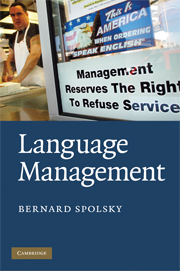Book contents
- Frontmatter
- Contents
- Acknowledgements
- 1 Towards a theory of language management
- 2 Managing language in the family
- 3 Religious language policy
- 4 Language management in the workplace: managing business language
- 5 Managing public linguistic space
- 6 Language policy in schools
- 7 Managing language in legal and health institutions
- 8 Managing military language
- 9 Local, regional, and national governments managing languages
- 10 Influencing language management: language activist groups
- 11 Managing languages at the supranational level
- 12 Language managers, language management agencies and academies, and their work
- 13 A theory of language management: postscript or prolegomena
- References
- Index
12 - Language managers, language management agencies and academies, and their work
Published online by Cambridge University Press: 05 June 2012
- Frontmatter
- Contents
- Acknowledgements
- 1 Towards a theory of language management
- 2 Managing language in the family
- 3 Religious language policy
- 4 Language management in the workplace: managing business language
- 5 Managing public linguistic space
- 6 Language policy in schools
- 7 Managing language in legal and health institutions
- 8 Managing military language
- 9 Local, regional, and national governments managing languages
- 10 Influencing language management: language activist groups
- 11 Managing languages at the supranational level
- 12 Language managers, language management agencies and academies, and their work
- 13 A theory of language management: postscript or prolegomena
- References
- Index
Summary
Agents and agency
The theory of language management that I am presenting insists on identifying agents, and is particularly opposed to what I perhaps a little unfairly dismiss as conspiratorial views of language policy. I have therefore attempted for each domain to explain which participants inside and outside constitute the “managers.” I have, however, been somewhat lax in that I have not so far characterized precisely the nature of management. There are obviously several stages in the process: there are the efforts to influence the policy-makers, there is the initiation and formulation of policy, there is the implementation of the policy, and there may be the evaluation and subsequent revision of policy and its implementation. In simple language management (Neustupný and Nekvapil 2003), all of these steps are taken by the individual speaker, but in organized language management, how is it divided?
In the family, like the individual, the processes are likely to be combined. Few families have a family council at which a language policy is hammered out. The family member who tries to manage the language practices and beliefs of other members of the family is likely to be the implementer as well as the judge of the effectiveness of implementation. Parents who try to maintain heritage language see the effect of their efforts, and modify them.
- Type
- Chapter
- Information
- Language Management , pp. 225 - 248Publisher: Cambridge University PressPrint publication year: 2009



